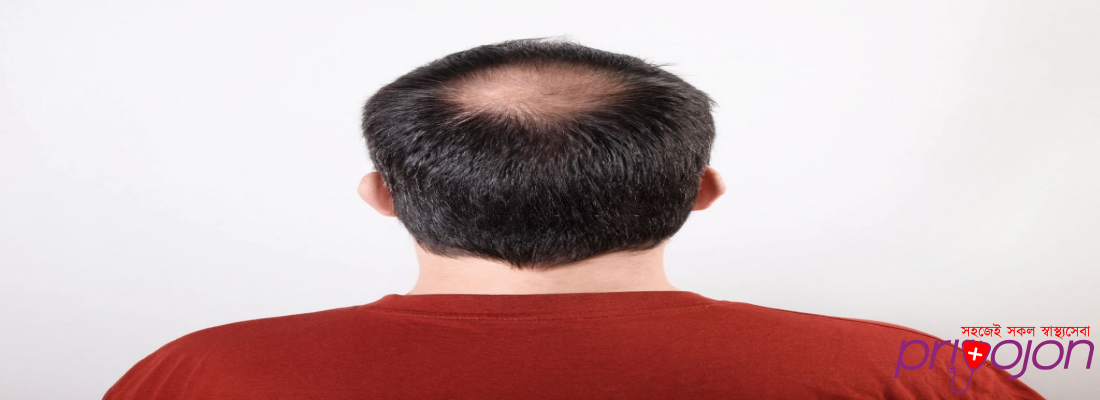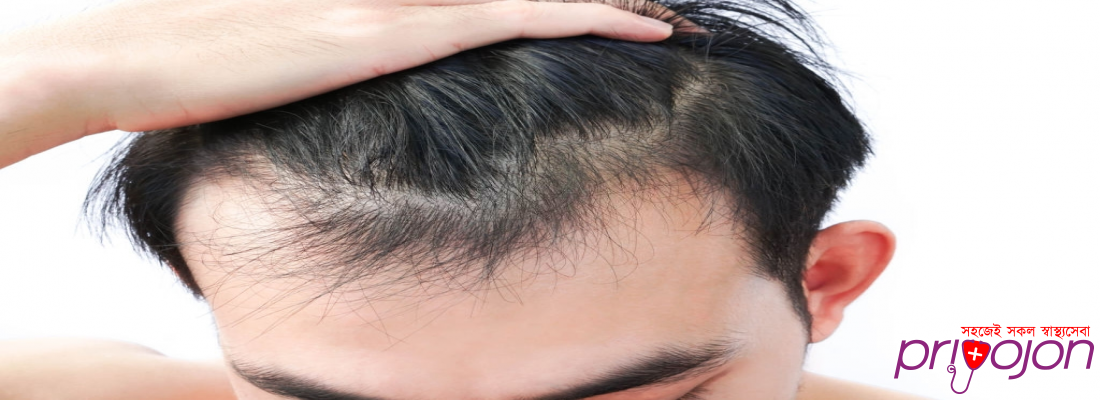Shared on 06-04-2020
Hair Loss - Symptom, Treatment And Causes
Hair Loss - Symptom, Treatment And Causes

What is Hair Loss?
Hair loss, also known as alopecia or baldness, refers to a loss of hair from part of the head or body. Typically, at least the head is involved. The severity of hair loss can vary from a small area to the entire body. Typically, inflammation or scarring is not present. Hair loss in some people causes psychological distress.
What are the types of Hair Loss:
The hair growth rate slows down as people age and is called alopecia. There are lot many hair losses types:
- Involutional Alopecia- It is the natural gradual thinning of hair with age. There is an increase in the number of hair follicles which enter resting phase and the other hairs become fewer and shorter.
- Androgenic Alopecia- Both women and men can be affected by this genetic condition. Men who have this condition may start losing hair even in their teenage years. This is known as male-pattern baldness. It is marked by gradual hair loss from the frontal scalp and the crown and the hairline receding. Women affected by this have hair thinning after their forties. It is known as female-pattern baldness and maximum hair loss happens near the crown.
- Alopecia Areata- It usually has a sudden onset and leads to hair loss in patches in young adults and children. It may lead to total balding (alopecia totalis). In over 90% people having this condition, the hair grows back within few years.
- Trichotillomania- It is observed most commonly in children. A person tears out their own hair because of this psychological disorder.
- Telogen Effluvium- Hair growth cycle changes lead to a temporary thinning of hair on the scalp. It happens due to a lot of hair entering resting phase which leads to shedding of hair and consequent thinning.
- Scarring Alopecia- It leads to irreversible hair loss. Inflammatory conditions of the skin like folliculitis, acne and cellulitis, results in scarring that destroys the hair’s ability to regenerate. Tightly woven hair and hot combs may result in irreversible hair loss as well.
- Hormones- Abnormal androgen levels may cause hair loss as well.
- Genes – Genes from either parents can increase the likelihood of a person having female or male pattern baldness.
- Drugs- Blood thinners, cancer treatment drugs, birth-control medication and beta blockers may lead to hair loss as well.
- Medical Predispositions- Diabetes, lupus, iron deficiency, thyroid disease, anemia and eating disorders may lead to hair loss. Usually when the root cause of the hair loss is treated, hair grows back again.
- Cosmetic- Procedures like perming, hair dyes, bleaching and over use of shampoo can all lead to thinning of hair, making it brittle and weak. Braiding hair tightly, using hot curlers or rollers also causes hair breakage and damage. These however don’t lead to baldness.
The hair regrows normally if the causative factor is stopped.
What is Hair Loss?
Hair loss, also known as alopecia or baldness, refers to a loss of hair from part of the head or body. Typically, at least the head is involved. The severity of hair loss can vary from a small area to the entire body. Typically, inflammation or scarring is not present. Hair loss in some people causes psychological distress.
What are the types of Hair Loss:
The hair growth rate slows down as people age and is called alopecia. There are lot many hair losses types:
- Involutional Alopecia- It is the natural gradual thinning of hair with age. There is an increase in the number of hair follicles which enter resting phase and the other hairs become fewer and shorter.
- Androgenic Alopecia- Both women and men can be affected by this genetic condition. Men who have this condition may start losing hair even in their teenage years. This is known as male-pattern baldness. It is marked by gradual hair loss from the frontal scalp and the crown and the hairline receding. Women affected by this have hair thinning after their forties. It is known as female-pattern baldness and maximum hair loss happens near the crown.
- Alopecia Areata- It usually has a sudden onset and leads to hair loss in patches in young adults and children. It may lead to total balding (alopecia totalis). In over 90% people having this condition, the hair grows back within few years.
- Trichotillomania- It is observed most commonly in children. A person tears out their own hair because of this psychological disorder.
- Telogen Effluvium- Hair growth cycle changes lead to a temporary thinning of hair on the scalp. It happens due to a lot of hair entering resting phase which leads to shedding of hair and consequent thinning.
- Scarring Alopecia- It leads to irreversible hair loss. Inflammatory conditions of the skin like folliculitis, acne and cellulitis, results in scarring that destroys the hair’s ability to regenerate. Tightly woven hair and hot combs may result in irreversible hair loss as well.
- Hormones- Abnormal androgen levels may cause hair loss as well.
- Genes – Genes from either parents can increase the likelihood of a person having female or male pattern baldness.
- Drugs- Blood thinners, cancer treatment drugs, birth-control medication and beta blockers may lead to hair loss as well.
- Medical Predispositions- Diabetes, lupus, iron deficiency, thyroid disease, anemia and eating disorders may lead to hair loss. Usually when the root cause of the hair loss is treated, hair grows back again.
- Cosmetic- Procedures like perming, hair dyes, bleaching and over use of shampoo can all lead to thinning of hair, making it brittle and weak. Braiding hair tightly, using hot curlers or rollers also causes hair breakage and damage. These however don’t lead to baldness.
The hair regrows normally if the causative factor is stopped.
Popular Health Tips
Mr Dr. Kazi Naushad-Un-Nabi
FRCP (Glasgow), MRCP (UK), MRCPCH (UK), DCH (IRE), MBBS (DMC)
15 Years of Experience
What is Hair Loss?
Hair loss, also known as alopecia or baldness, refers to a loss of hair from part of the head or bo...
What is hair transplant?
Medically reviewed by
Mr Dr. Kazi Naushad-Un-Nabi
FRCP (Glasgow), MRCP (UK), MRCPCH (UK), DCH (IRE), MBBS (DMC)
15 Years of Experience
- Written by the Priyojon Editorial Team

